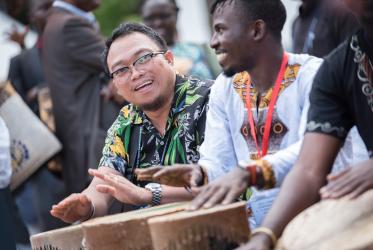“Science and religion can provide solutions to poverty and injustice.” This was the theme of the 3rd International Conference on Sustainable Alternatives for Poverty Reduction and Ecological Justice (SAPREJ) in Kampala, Uganda, on 4-7 April. The conference was organized by the Kyambogo University and the World Council of Churches (WCC) economic and ecological justice programme.
Dr Louk Andrianos is WCC consultant for care of creation, sustainability and climate justice. He is also the international chair and founder of the SAPREJ initiative, which has brought hope and shared knowledge on alleviating poverty and bringing ecological justice on local and international levels.
The SAPREJ conference engages multidisciplinary and ecumenical dialogues on key social, economic and ecological concerns from a variety of perspectives. It is a blend of learning and discussion, while sharing the perspectives of local communities and attending to the physical and cultural beauty of the hosting country.
After welcome addresses by members of the SAPREJ steering committee, David Zac Niringiye, a retired assistant bishop from the Anglican Church of Uganda, opened the conference and emphasized the importance of collaboration between religion and (political) science in tackling poverty and injustice. He pointed out that 67% of the population of Uganda lives in poverty and more than 70% of Ugandan youth are jobless. Corruption is among the worst causes of poverty and ecological injustice in Uganda but some churches remain passive or even collaborate with the corrupted system, said Niringiye. Highlighting his “Black Monday” movement against corruption, he denounced as monsters those who foster corruption and steal from the lives of the poor because of personal or corporate greed.
More than 100 participants from Africa, Europe, North Americas, the Middle East and Asia attended the conference. Forty-eight talks were presented and many students from the faculty of education and development studies of the Kyambogo University were able to follow all the presentations without fees, thanks to WCC funds. “We are grateful for WCC help because it is a lifetime chance for us to interact and discuss with international scholars,” said Tusubira Mathelo, a student at Kyambogo University.
Rev. Dr Grace Lubaale, lecturer at Kyambogo University, noted that this is the first time that the term “ecological justice” has been so largely discussed among the general public in Uganda.
Prof. Diana Woodcock, originally from the USA but teaching at Virginia Commonwealth University in Qatar, offered an “eco-poetry reading,” entitled “Leaning into the Light—Poets and Prophets Illuminating the Way.” Participants then discussed topics such as economical ethics; eco-theology; poverty; climate change; sustainable policy; production, distribution and consumption patterns; food science and biodiversity conservation; permaculture and case studies.
They discussed critical questions such as: Can Christianity provide an ethical framework for land grabbing in Africa? Can biotechnology help poverty reduction and eco-justice in Africa? Dr Jim Chou, from Taiwan, brought Western theology and Eastern wisdom together to illuminate eco-justice issues. He cited Jesus calling: “Go into all the world and preach the gospel to all creation” (Mark 16:15) and some Chinese cultural wisdom stating that “Too much is as bad as less.”
Prof. Lesya Sabada, from the University of Saskatchewan, Canada, talked about religious peace building, noting: ”Faith brings profound social responsibility and the mandate to work for justice in society.”
At the end of the conference, a common declaration was elaborated to raise the voices of the poor and the “wounded” nature of Uganda, hoping for salvation and peace.









